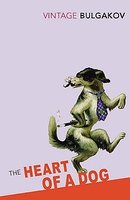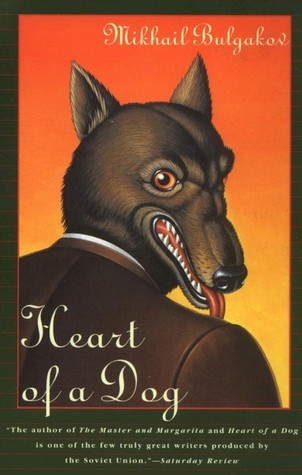Heart of a Dog – Mikhail Bulgakov – 1968
Reviewed by: Bill Stratton Date: 1 September 2002
Bulgakov’s long suppressed novel Heart of a Dog deserves to be ranked among the greatest works of satire in the 20th century. Unpublished for over 50 years, due to what was seen as its harsh criticism of Stalinist Russia, Heart of a Dog is as relevant now as it was in 1925. Part of its greatness lies in Bulgakov’s subtlety in re-presenting the theme manifest in as widely varied texts as Genesis to Mary Shelley‘s Frankenstein, concerning the relationship and duties attendant upon the creator and the created.
 Although some have only assessed Heart of a Dog vis-à-vis Stalinist Russia and interpreted it as merely a single-minded attack of the Socialist mindset, I believe that this view unfairly limits Bulgakov’s work to a myopic ideological position, which if valid would seem to render it socially and politically irrelevant to contemporary readers. On the contrary, I believe that the inherent value of Heart of a Dog is illustrated by the implications of the satirization of Sharik‘s transformation from a starving mutt wandering the streets of Moscow into a petty Marxist bureaucrat by the would-be Soviet Dr Frankenstein, Philip Philippovich. The double meaning implicit in the monstrous creation that represents an amalgamation of Pavlovian conditioning and supernatural creation demonstrates the foolishness of any form of social engineering or the blind adherence to dogmatic belief systems, rather they be Marxist, Capitalist or religious.
Although some have only assessed Heart of a Dog vis-à-vis Stalinist Russia and interpreted it as merely a single-minded attack of the Socialist mindset, I believe that this view unfairly limits Bulgakov’s work to a myopic ideological position, which if valid would seem to render it socially and politically irrelevant to contemporary readers. On the contrary, I believe that the inherent value of Heart of a Dog is illustrated by the implications of the satirization of Sharik‘s transformation from a starving mutt wandering the streets of Moscow into a petty Marxist bureaucrat by the would-be Soviet Dr Frankenstein, Philip Philippovich. The double meaning implicit in the monstrous creation that represents an amalgamation of Pavlovian conditioning and supernatural creation demonstrates the foolishness of any form of social engineering or the blind adherence to dogmatic belief systems, rather they be Marxist, Capitalist or religious.
If not, the obvious referencing to Pavlov’s experiments would be of little consequence since the very process of conditioning a dog to react in a certain way to a given stimulus assumes the necessary arbitrariness of the stimulus involved, whether blinking lights or bells, which are symbolic of the difference between ideologies of Marxism and capitalism. Thus, while Heart of a Dog represents an explicit condemnation of the Stalinist regime, it is at the same time an implicit critique of the herd mentality itself that gives rise to such social phenomena in the first place. As it stands, the mis-adventures of Sharik, as he oscillates between the conditions of unwanted dog and “common” man, gives voice to a biting critique of modernity that grew out of an era most rapt by dreams of progress and utopian achievement beyond human imagination born from what soon became the horror or technological achievement that saw the dawning of the Atomic age.
















